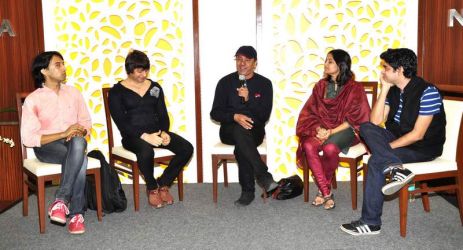KASHISH AT NOMURA
Panel discussion on queer portrayals in popular Indian cinema

KASHISH Mumbai International Queer Film Festival followed up its commitment to take ahead mainstreaming queer issues, by conducting a panel discussion at the corporate office of Nomura, for their staff members.
Nomura, as Associate Partner of KASHISH 2012, had sponsored a panel discussion ‘The Pink Screen: Breaking the glass ceiling for queer portrayals in popular Indian cinema’ during the 3rd edition of the festival in May 2012, They had also expressed a desire that a similar panel discussion be held at their offices for their staff members, as part of Nomura’s Diversity & Inclusion activity.
The panel discussion at Nomura office on January 9,, 2013, was attended by more than 100 Nomura employees. Renuka Shahane, well-known model, actress and filmmaker, Mayank Shekar, a popular writer and film critic, Kapil Sharma, actor and writer who shot to fame with his daring and bold film ‘Dunno Y… Na Jaane Kyon’ and Pradipta Ray, production designer and filmmaker who also teaches at NID were part of the panel which was moderated by Sridhar Rangayan, filmmaker and festival director of KASHISH.
The evening began with a presentation about Nomura’s Diversity & Inclusion objectives and initiatives. It was clear that companies that had an inclusive LGBT policy had lesser turnaround of LGBT employees and also young graduates looking to join companies do check out the company’s diversity policies before making their decisions.
Pallav Patankar, former co-festival director, spoke about KASHISH Mumbai International Queer Film festival, its mission and objectives. Saagar Gupta, festival programmer, introduced the panelists.
The panel discussion focused on the portrayal of gay, lesbian and transgender characters in popular cinema, theater and television shows. It questioned whether Bollywood producers, distributors, financiers and the “mainstream audience’’ was ready for sensitive queer characters.
Renuka Shahane felt that there was still a feeling of ‘the other’ when it comes to even thinking about queer characters, because people still do not have an understanding of the ‘minority’ community. But she mentioned that when she hosted a television show where she interviewed transgender persons, there was a lot of interest to know more about them, even from middle class audiences.
Mayank Shekar corroborated this by citing a focus group discussion carried out by a big production company to check if audiences were ready for a film with gay characters. The general consensus was “Yes!” He mentioned that there was definitely an improvement from the days when queer characters were mere caricatures, to now when they are dealt with, with some respect.
Kapil Sharma, talked about difficulties of making the film ‘Dunno Y…’ and the backlash he faced, when he had a group of members from a political party picket his house to protest, asking him not to release the film. He highlighted the difficulty faced in distributing the film as not many mainstream distributors or theatre chains were willing to distribute the controversial film.
Pradipta Ray, said that Bollywood sees filmmaking primarily as a business and if films with gay or lesbian content are not seen as profitable, they will never be made. Having worked very closely with the mainstream film industry as an art director, he felt that there is no discrimination within the industry against gay, lesbian or transgender persons as long as they have talent and are hardworking. He also talked, on a personal note, about his experiences of performing as a ‘launda’ dancer in Gangs of Wasseypur 2 and as an ‘out’ transgender man who is part of the teaching faculty at the rather conservative National Institute of Design at Ahmedabad. He said that it is all about one’s own confidence and conviction.
Sridhar Rangayan, moderating the panel, also touched upon his own experiences with censorship, which could prove to be a barrier to many filmmakers making films on homosexuality and transsexuality. He felt that the future of queer cinema lies in independent films, short films and documentaries that are being made in increasing numbers. He mentioned that, because of lack of distribution opportunities LGBT films were hardly seen, and that’s where KASHISH comes into picture to provide a platform for these films.
There were several questions from the audience members, particularly about the clichés and caricatures in cinema and when they will see LGBT characters as ‘regular’ people.
Nomura representatives expressed their satisfaction at the Nomura – KASHISH collaboration in initiating dialogue around LGBT issues.
